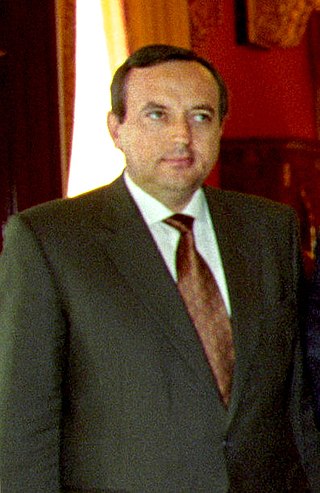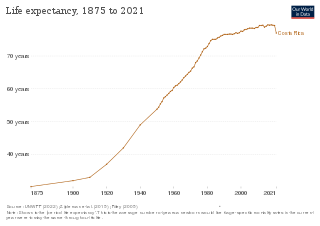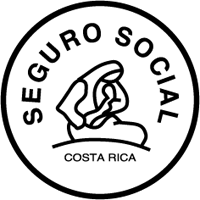
The politics of Costa Rica take place in a framework of a presidential, representative democratic republic, with a multi-party system. Executive power is exercised by the president and their cabinet, and the President of Costa Rica is both the head of state and head of government. Legislative power is vested in the Legislative Assembly. The president and 57 Legislative Assembly deputies are elected for four-year terms. The judiciary operates independently from the executive and the legislature, but is involved in the political process. Costa Rica has a strong system of constitutional checks and balances. Voting is compulsory de jure, but this is not enforced.

Rafael Ángel Calderón Fournier was President of Costa Rica from 1990 to 1994. He was the presidential candidate of the Social Christian Unity Party for the national elections held in February 2010, but resigned his candidacy on 5 October 2009, when he was sentenced to five years in prison for two counts of corruption.

The University of Costa Rica is a public university in the Republic of Costa Rica, in Central America. Its main campus, Ciudad Universitaria Rodrigo Facio, is located in San Pedro Montes de Oca, in the province of San José. It is the oldest and largest institution of higher learning in Costa Rica, originally established as the Universidad de Santo Tomás in 1843. Approximately 45,000 students attend UCR throughout the year.
Eduardo Augusto Doryan Garrón was Executive President of the Costa Rican Electricity Institute (ICE) for the period 2010–2011. Until April 2010 he was the Executive Presidente of the Caja Costarricense de Seguro Social. He assumed the role in May 2006, following the second election of president Oscar Arias. He has also previously served as Minister of Education (1994-1998) and Vice-Minister of Science and Technology (1986-1990), all under National Liberation Party governments. Doryan has also had a long and diverse career in academic, public service, consulting and with international organizations.
Prostitution in Costa Rica is legal. Costa Rica's legal system is based on Roman law rather than common law, and so for prostitution to be illegal it would have to be explicitly stated as such in a penal code, and it is not. Nevertheless, many of the activities surrounding it are illegal, as the law forbids promoting or facilitating the prostitution of another, and therefore pimping, brothels, or prostitution rings are illegal. Prostitution is common and is practiced openly throughout the country, particularly in popular tourism destinations.

The National Insurance Institute is an autonomous institution, which was responsible for Costa Rican insurance monopoly in that country until 2008, when insurances were opened to a competitive market.
Catedral is a district of the San José canton, in the San José province of Costa Rica, it is one of the four administrative units that form San José downtown properly.

Costa Rica provides universal health care to its citizens and permanent residents. Both the private and public health care systems in Costa Rica are continually being upgraded. Statistics from the World Health Organization (WHO) frequently place Costa Rica in the top country rankings in the world for long life expectancy. WHO's 2000 survey ranked Costa Rica as having the 36th best health care system, placing it one spot above the United States at the time. In addition, the UN has ranked Costa Rica's public health system within the top 20 worldwide and the number 1 in Latin America.

Román Macaya Hayes is a Costa Rican scientist, entrepreneur, diplomat, and public servant. From 2018-2022 he served as the Executive President and Chairman of the Board of the Costa Rican Social Security [Caja Costarricense de Seguro Social (CCSS)], the institution that finances and provides universal coverage of public health care services in Costa Rica and manages the largest pension fund of the country. In this role he led the health care delivery response to the COVID-19 pandemic. Macaya spearheaded key priority programs, such as deploying the largest investment in physical and technological infrastructure in the history of the CCSS, promoting innovation throughout the institution, implementing the most ambitious digital transformation agenda, and revamping both the health care delivery and pension system to respond to a rapidly aging population.
Abortion in Costa Rica is severely restricted by criminal law. Currently, abortions are allowed in Costa Rica only in order to preserve the life or physical health of the woman. Abortions are illegal in almost all cases, including when the pregnancy is a result of rape or incest and when the foetus suffers from medical problems or birth defects. Both social and economic factors have led to this legal status. It remains unclear whether abortions are legal to preserve the mental health of the woman, though the 2013 United Nations abortion report says Costa Rica does allow abortions concerning the mental health of a woman.

Luis Guillermo Solís Rivera is a Costa Rican politician and educator who was the 47th President of Costa Rica from May 8, 2014 to May 8, 2018. He is a member of the Citizens' Action Party (PAC).
Guido Miranda Gutiérrez was a Costa Rican civil servant and medical doctor. Miranda is credited with spearheading the effort to push the Costa Rican Department of Social Insurance from the capital of San José into smaller municipalities and rural regions.
Ruperto Marvin Atencio Delgado is a Costa Rican lawyer, health professional, and deputy.
Trade unions in Costa Rica advocate for the rights of workers in Costa Rica. Dating back to the late 1800s, labor unions in the country have been a political force. They remain active in political and social life for many Costa Ricans.

Estela Quesada (1924–2011) was a Costa Rican teacher, lawyer and politician. She was one of the first three women elected to the Costa Rican legislature in the first election after women attained enfranchisement. She was the first woman to hold a cabinet-level position in Costa Rica as Minister of Education and was later the first woman to serve as minister of Labor and Social Security. She was inducted into the National Women's Institute Gallery as an Outstanding Woman of Costa Rica in 2009.

Margarita Bertheau Odio was a Costa Rican painter and cultural promoter. The Costa Rican Art Museum states that she is known for "landscapes, portraits, watercolor figures and her geometric, surrealistic and abstract work." She was called the first female Watercolor painting artist in her country. She had independent views and was contemporary with the first wave of Costa Rican artists that included Dinora Bolandi, Lola Fernandez and Sonia Romero. These four are famous for teaching fine art at the University of Costa Rica and to have created the second generation of Costa Rican women artists.
Social Guarantees were a series of progressive political reforms made in Costa Rica in the 1940s for the benefit of the working classes. They came about as a result of the alliance between various political and religious figures. Though a widespreads effort, there were three main leaders:
The COVID-19 pandemic in Costa Rica was a part of the ongoing worldwide pandemic of coronavirus disease 2019 caused by severe acute respiratory syndrome coronavirus 2. The virus was confirmed to have spread to Costa Rica on 6 March 2020, after a 49-year-old woman tourist from New York, United States, tested positive for the virus.
Adrián Arguedas Ruano is a Costa Rican contemporary artist who works in painting, printmaking and sculpture.

Beginning on the night (UTC-6:00) of April 17, 2022, a ransomware attack began against nearly 30 institutions of the government of Costa Rica, including its Ministry of Finance, the Ministry of Science, Innovation, Technology and Telecommunications (MICITT), the National Meteorological Institute, state internet service provider RACSA, the Costa Rican Social Security Fund, the Ministry of Labor and Social Security, the Fund for Social Development and Family Allowances, and the Administrative Board of the Municipal Electricity Service of Cartago.










